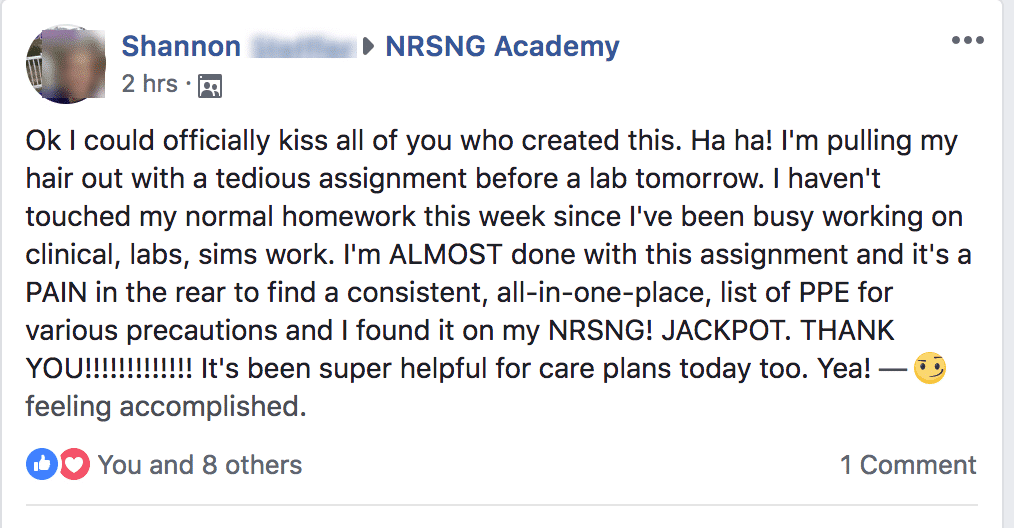NURSING.com includes 300+ engaging video lessons with "must know" content for NCLEX prep . . . Try These Lessons For Free
Lessons come from our Unofficial NCLEX Review Podcast

We will discuss the factors contributing to continuity of care in the community and why continuity is important.
How to dispose of hospital waste. General medical waste, infectious medical waste, Hazardous medical waste, and radioactive medical waste.
We will discuss ciritcal incidents and how we prepare for them. What is the nurse's role during a critical incident? What does the team do after the event?
How to inspect equipment for electrical hazard and what to do in case of equipment malfunction/fire.
Overview Disposal of Waste General medical waste Infectious medical waste Hazardous medical waste Radioactive medical waste Nursing Points General General medical waste Not considered hazardous Paper, plastic and office waste...
How do nurses implement an emergency response plan. Using color coding to mark patients in a disaster.
We will discuss the phases of emergency management and the nurse’s role for each phase.
Anaphylaxis is a sudden and severe allergic reaction. When the allergens enter the body there is a rapid inflammation and vasodilation.
Overall guiding forces of nursing practice are: ethics, legal, safety, and prioritization
Discuss fall and injury prevention. How to prevent falls in patients, and how to prevent injury and healthcare workers.
Let’s talk today about discharge teaching after a patient has surgery!
Identify and faciliate correct use of infant and child care seats.
Providing your patients with appropriate methods to signal staff members.
Determine knowledge of safety procedures for staff and patients in a specific code. What do you do as a staff member during that code?
An infection is a disease caused by microorganisms infecting tissues.
Different contagious diseases, how they are spread and the popluations most likely to be affected.
Discuss procedures when reporting a patient with communicable diseases.
The only prep you need; content, questions, simulation. That's how much confidence we have in YOU.
An infection is a disease caused by microorganisms infecting tissues.
Utilizing appropriate precautions for immunocompromised patients.
What is a sterile fields are and how to set them up.
How to set up contact isolation on patients that need specific isolations.
Taking a look at restraints and some basic principles behind using them.
Identify and verify prescriptions for treatments that may contribute to an accident or injury.
How to make appropriate room assignments for cognitively impaired patients.
Muscle physiology and how it works at a microscopic level.
In this lesson, we will look at some tips to help you document like a pro.
In this lesson we are going to talk about how to communicate with providers.
How to prevent falls in patients, and how to prevent injury and healthcare workers.
We will discuss the factors contributing to continuity of care in the community and why continuity is important.
Identify and manage the patients valuables according to facility policy.
What causes seizures, and how we assess and treat them medically. Implement seizure precautions for at-risk patients.
How do you determine which patients(s) to recommend for discharge in a disaster situation.
Verify appropriateness and/or accuracy of a treatment order.
Discuss the factors contributing to continuity of care in the community and why continuity is important.
Discuss practicing in a manner consistent with a Code of Ethics for registered nurses.
Provide instruction and information to patient about body positions that eliminate potential for repetitive stress injuries.
As a nurse, you will work with many different professions. In this lesson, we will discuss some of the most common members of the medical team including what they do, and how you are involved with them.
Identify Responsibilities of Each Health Care Team Member.
Thinking like a nurse. This is something you’ve heard before. People telling you, “You need to start thinking like a nurse.” I’m going to show you how.
In this lesson I will explain how to best communicate with other nurses and patients.
Legal considerations like state and federal laws, and how it affects your nursing practice.
Providing a concise nursing report allows for greater continuity of care. .
The only prep you need; content, questions, simulation. That's how much confidence we have in YOU.
Core principles of what guides our practice as nurses.
Review facility policy and state mandates prior to agreeing to serve as an interpreter for staff or primary health care providers.
Anytime a patient is going to have a surgery or procedure there is information that the provider or surgeon must give to the patient so that the patient can decide whether or not they want to have the surgery or procedure.
Report unsafe practice of Health Care Personnel and intervene as appropriate.
Providing Care Within the Legal Scope of Practice.
Report patient condition as required by law. Legal considerations like state and federal laws, and how it affects your nursing practice.
Identify and educate about legal issues affecting the Patient.
Assess understanding of confidentiality of patients rights.
We will discuss the factors contributing to continuity of care in the community and why continuity is important.
Patients who are in late adulthood will begin to require extra support as their mobility decreases and they experience changes to hearing, vision and cognition.
In this lesson, you will learn the reasoning behind creating a nursing care plan. We will look at nursing care plan use during nursing school and clinical practice.
Define performance improvement and quality assurance activities.
How do you provide cost effective care for your patients.
How to plan and implement care for specific patient needs.
In this lesson, you will learn the reasoning behind creating a nursing care plan. We will look at nursing care plan use during nursing school and clinical practice.
When you take practice NCLEX questions, it is important to understand that the NCLEX organizes questions into various categories; providing a safe and effective care environment, health promotion and maintenance, psychosocial integrity, and physiological integrity. These categories are further broken down to create a total of 8 categories.
We all want to say that we passed the NCLEX in 75 questions. But more important than that is that you PASS. It doesn't matter how many times you took it or how many questions it took - the end result is the same - you will be an RN.
In all my years as a nurse, I never have had a patient ask me how many questions I had on my NCLEX exam.
With that said . . .
You should practice many many questions prior to test day. We usually recommend working your way up from 20/day to upwards of 100+/day as you get closer and closer the NCLEX.
Use the NCLEX Questions of the Day to get started. Our questions are free and you can take as many as you want.






